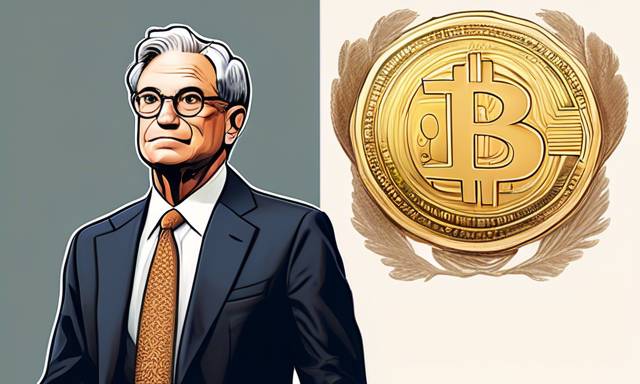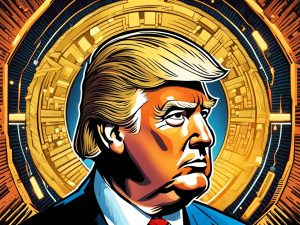Is Crypto for Criminals? A Misunderstood Market Redefined
So picture this: You’re at a café, maybe sipping on your favorite cold brew, and a buddy starts talking about how the cryptocurrency market is just a tool for drug dealers and illicit activities. It’s a pretty common stereotype, right? Frankly, it’s incredibly frustrating if you’re like me—someone who dives deep into the crypto world and genuinely believes in its potential. But here’s the catch: with big names like Minneapolis Federal Reserve President Neel Kashkari throwing around statements that crypto is primarily for shady businesses, it’s easy to see why the average person might be skeptical.
Key Takeaways:
- Neel Kashkari’s comments paint cryptocurrencies as vehicles for crime, a viewpoint many find outdated.
- A vast majority of transactions involve reputable services and products, contrary to what some regulators say.
- Institutional interest in crypto is rising, despite dissenting views from officials.
- Only a small portion of Americans are actively using cryptocurrencies in everyday transactions.
Now, let’s dig into what this all means for the crypto market and why, even if some people see it as a "giant garbage dumpster," there’s way more happening beneath the surface.
The Dismissive Tone of Regulators
Kashkari recently made quite the splash at a town hall in Wisconsin, suggesting very few transactions in crypto are for, you know, “actual” goods and services. This scenario isn’t just a flash in the pan—he’s long had a history of downplaying crypto’s value, famously hurling insults like calling it a “giant garbage dumpster” not too long ago.
What’s interesting here is that his perspective isn’t totally off-base; after all, crypto has been associated with illicit transactions in the past—think Silk Road and all that jazz. But here’s where it gets juicy: the crypto landscape is changing fast, and it’s not just about shady dealings anymore.
Real Trends Backing Crypto’s Utility
Despite Kashkari’s assertions, the data tells a different story. According to a Pew Research Center survey from 2023, only 17% of adult Americans reported ever owning digital assets. However, that paints a narrow view of crypto’s usage. Only about 2% of the adult population made even one payment using cryptocurrencies last year. This figures seem small, but here’s the kicker: the pre-existing framework of regulations and institutions hasn’t kept up.
And let’s not ignore the wave of institutional adoption. A recent poll indicated that about 80% of institutional investors are eyeing a ramp-up in their investments in digital assets! Why? Well, I’d argue it’s because they see the evolving technology and its potential beyond criminality.
The Silver Lining in Criticism
Now, don’t get me wrong—the criticisms from Kashkari and others are not entirely devoid of merit. But the industry is continually pushing back. Crypto advocates argue that legitimate projects follow robust anti-money laundering protocols. As Caitlin Long pointed out, many serious projects prioritize compliance and work hard to erase that negative stigma.
And when you see established firms and mainstream investors flocking to the cryptocurrency space, it kind of makes you think: is it really just a haven for illegal activities? Or could it be that we’re witnessing the evolution of a technology that many people just don’t understand yet?
Tips to Navigate This Chaotic Terrain
So, what’s a novice investor (or even a seasoned one) to do in such complicated waters? Here are a few practical tips:
-
Do Your Homework: Don’t just dive into the latest coin trending on Twitter. Research real use cases, the technology behind it, and the team’s credibility.
-
Understand the Risks: The crypto market is volatile and full of misconceptions. Know what you’re getting into—invest only what you can afford to lose.
-
Follow the Institutions: With 80% of institutional managers looking to invest more in crypto, maybe there’s some wisdom in following those big-money players.
-
Diversification is Key: Like with any investment, don’t put all your eggs in one basket. Explore multiple coins or digital assets that align with your values or interests.
- Join the Conversation: Platforms like Twitter, Reddit, or even local meetups can provide new insights. You’ll often learn quicker than from financial news articles.
My Own Two Cents
Honestly, the crypto market has room for everyone—whether you believe in decentralized currency or you’re still skeptical about it. It’s evolving, and that comes with its ups and downs. Despite negative narratives from people like Kashkari, real utility emerges when people start using it—and we’re already seeing glimmers of that shift.
But it does leave me pondering one thing. With all the technological advancements and the undeniable traction institutional investors are gaining, will the narrative around crypto being a criminal tool eventually fade? Or will it stick around like a bad cold? Let’s chat about it!





 By
By
 By
By

 By
By
 By
By
 By
By